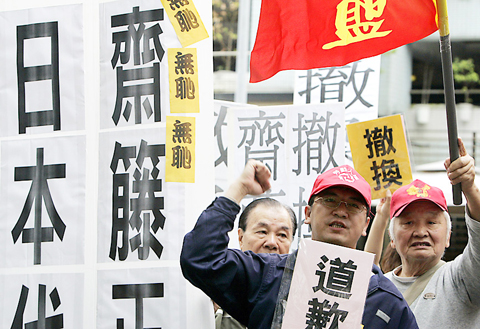China has complained to Japan about comments by a top Japanese diplomat that Taiwan’s political status was up in the air, the Chinese foreign ministry said yesterday, testing ties still scarred by World War II.
Taiwanese activists protested at the de facto Japanese embassy in Taipei on Monday, three days after top Japanese envoy Saito Masaki told a university forum that Taiwan’s status had “not been determined,” angering the Taiwanese government.
“We express our strong dissatisfaction [with the comments],” Chinese foreign ministry spokesman Ma Zhaoxu (馬朝旭) said in a statement on its Web site. “The Chinese government has already made solemn representations with the Japanese side.”

PHOTO: PICHI CHUANG, REUTERS
Japan recognizes China over Taiwan and thus cannot have an official embassy in Taiwan.
Saito said he was stating only personal views and the de facto embassy said it took no official position on Taiwan’s “legal status.”
Chinese spokesman Ma repeated Beijing’s official position that Taiwan is an inseparable part of China.
“Any scheme to try to create discussion on Taiwan’s status is a provocation of China’s core interests and cannot be accepted by the Chinese government or its people,” he said.
Ties between China and Japan are often testy because of Beijing’s insistence that Tokyo has never properly atoned for its brutal occupation of large parts of China during World War II.
Meanwhile, President Ma Ying-jeou (馬英九) yesterday restated his position that the Treaty of Taipei of 1952 affirmed the transfer of Taiwan’s sovereignty to the Republic of China (ROC).
With Saito absent, Ma told Japanese parliamentarian Mitsuhide Iwaki that his visit came at an appropriate time because his administration had just celebrated the 57th anniversary of the signing of the treaty.
Japan and the ROC signed the accord at the Taipei Guest House on April 28, 1952. The Sino-Japanese Peace Treaty, better known as the Treaty of Taipei, affirms the 1951 San Francisco Peace Treaty and states that the Japanese government renounces any claim to Taiwan, Penghu, the Spratly Islands and the Paracel Islands.
It did not, however, specify the legal successor government of the territories.
During the unveiling ceremony in Taipei last week of a sculpture depicting Japanese and ROC representatives signing the treaty, Ma said that the treaty affirmed the transfer of Taiwan’s sovereignty from Japan to the ROC.
On Friday, Saito told a meeting at National Chung Cheng University that Taiwan’s status remained “unresolved.”
Saito later apologized for his remarks after the Ministry of Foreign Affairs lodged a protest and demanded an explanation.
KMT lawmakers also wanted to make Saito persona non grata and have him replaced. Pro-unification groups condemned him, demanding he leave the country and that Tokyo apologize.
Ma said the 1952 pact was significant because it asserted the ROC’s claim over Taiwan, which was returned to the ROC in 1945.
Tokyo and Taipei have a sound relationship, Ma said. Although Japan and the ROC severed ties 20 years after the treaty was signed, Ma said he designated this year as “the year of advancing the special partnership between Taiwan and Japan” with the hope of furthering bilateral ties.
Among many achievements, Ma said Japan had given the green light for a Taiwanese representative office in Sapporo to offer assistance to Taiwanese visitors.

PREPAREDNESS: Given the difficulty of importing ammunition during wartime, the Ministry of National Defense said it would prioritize ‘coproduction’ partnerships A newly formed unit of the Marine Corps tasked with land-based security operations has recently replaced its aging, domestically produced rifles with more advanced, US-made M4A1 rifles, a source said yesterday. The unnamed source familiar with the matter said the First Security Battalion of the Marine Corps’ Air Defense and Base Guard Group has replaced its older T65K2 rifles, which have been in service since the late 1980s, with the newly received M4A1s. The source did not say exactly when the upgrade took place or how many M4A1s were issued to the battalion. The confirmation came after Chinese-language media reported

The Taiwanese passport ranked 33rd in a global listing of passports by convenience this month, rising three places from last month’s ranking, but matching its position in January last year. The Henley Passport Index, an international ranking of passports by the number of designations its holder can travel to without a visa, showed that the Taiwan passport enables holders to travel to 139 countries and territories without a visa. Singapore’s passport was ranked the most powerful with visa-free access to 192 destinations out of 227, according to the index published on Tuesday by UK-based migration investment consultancy firm Henley and Partners. Japan’s and

A Ministry of Foreign Affairs official yesterday said that a delegation that visited China for an APEC meeting did not receive any kind of treatment that downgraded Taiwan’s sovereignty. Department of International Organizations Director-General Jonathan Sun (孫儉元) said that he and a group of ministry officials visited Shenzhen, China, to attend the APEC Informal Senior Officials’ Meeting last month. The trip went “smoothly and safely” for all Taiwanese delegates, as the Chinese side arranged the trip in accordance with long-standing practices, Sun said at the ministry’s weekly briefing. The Taiwanese group did not encounter any political suppression, he said. Sun made the remarks when

BROAD AGREEMENT: The two are nearing a trade deal to reduce Taiwan’s tariff to 15% and a commitment for TSMC to build five more fabs, a ‘New York Times’ report said Taiwan and the US have reached a broad consensus on a trade deal, the Executive Yuan’s Office of Trade Negotiations said yesterday, after a report said that Washington is set to reduce Taiwan’s tariff rate to 15 percent. The New York Times on Monday reported that the two nations are nearing a trade deal to reduce Taiwan’s tariff rate to 15 percent and commit Taiwan Semiconductor Manufacturing Co (TSMC, 台積電) to building at least five more facilities in the US. “The agreement, which has been under negotiation for months, is being legally scrubbed and could be announced this month,” the paper said,